过去分词作宾补
人教版高中英语必修五过去分词作宾语补足语
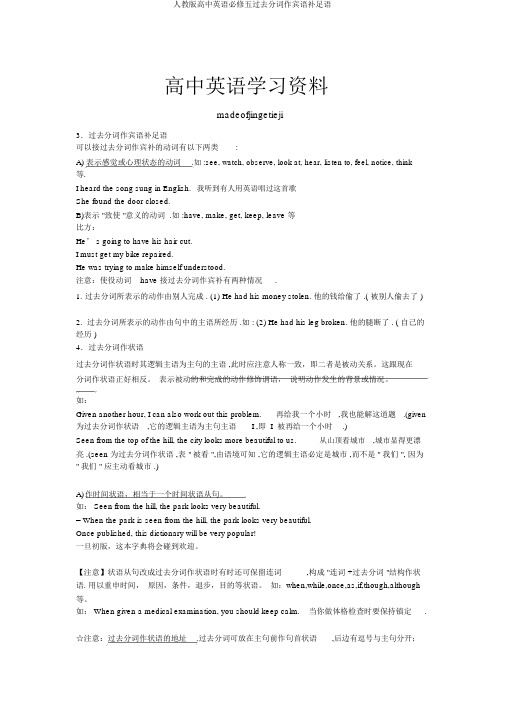
高中英语学习资料madeofjingetieji3.过去分词作宾语补足语可以接过去分词作宾补的动词有以下两类:A) 表示感觉或心理状态的动词.如 :see, watch, observe, look at, hear, listen to, feel, notice, think 等.I heard the song sung in English.我听到有人用英语唱过这首歌She found the door closed.B)表示 "致使 "意义的动词 .如 :have, make, get, keep, leave 等比方:He’ s going to have his hair cut.I must get my bike repaired.He was trying to make himself understood.注意:使役动词have 接过去分词作宾补有两种情况.1.过去分词所表示的动作由别人完成 . (1) He had his money stolen. 他的钱给偷了 .( 被别人偷去了 )2.过去分词所表示的动作由句中的主语所经历 .如 : (2) He had his leg broken. 他的腿断了 . ( 自己的经历 )4.过去分词作状语过去分词作状语时其逻辑主语为主句的主语 ,此时应注意人称一致,即二者是被动关系。
这跟现在分词作状语正好相反。
表示被动的和完成的动作修饰谓语,说明动作发生的背景或情况。
如:Given another hour, I can also work out this problem.再给我一个小时,我也能解这道题.(given 为过去分词作状语,它的逻辑主语为主句主语I ,即 I 被再给一个小时.)Seen from the top of the hill, the city looks more beautiful to us.从山顶看城市,城市显得更漂亮 .(seen 为过去分词作状语 ,表 " 被看 ",由语境可知 ,它的逻辑主语必定是城市 ,而不是 " 我们 ", 因为" 我们 " 应主动看城市 .)A)作时间状语,相当于一个时间状语从句。
“过去分词”之作定语、表语、宾补

“过去分词”之作定语、表语、宾补[讲一讲]一、过去分词作定语时,常指已完成的动作且与所修饰词之间为被动关系。
一般来说,如果是单个的过去分词,则放在所修饰词前,若是一个过去分词短语,则放在所修饰词后。
二、过去分词作表语时,往往表示一种状态,而被动语态则表示一个动作。
三、过去分词作宾语补足语时,表示被动或完成,作宾补的过去分词所表示的动作与宾语之间存在逻辑上的动宾关系。
常见的可以接过去分词作宾补的动词有感官动词,使役动词以及leave, keep, want等。
另外,在with的复合结构中,也可以接过去分词。
如:With his homework finished, Peter went out to play football. 功课做完后,彼得出去踢足球了。
过去分词作宾补的特殊用法:have / get sth. done结构的三种意义:1. 使得某事被做(自己做);2. 让/请别人做某事;3. 遭遇某种情况。
如:Look at your dirty clothes; you’d better get them washed.瞧你那脏衣服,你最好去洗洗。
(自己洗)I will have my long hair cut short tomorrow.我明天要去把我的长头发剪短。
(别人剪)I had my purse stolen on the bus.在公交车上,我的钱包让人给偷了。
(遭遇某种情况)[练一练]I. 翻译下列词组或句子。
1. 一个满意的微笑2. 惊恐的一瞥3. 一副惊讶的表情4. 你应该设法让人听懂你的话。
5. 他在百货大楼让人修好了电视机。
6. 我想让此事立刻得到解决。
II. 下面的补语都应该用过去分词来充当吗?请试试看!1. I’ll have my photo ______ (take) tomorrow.2. I want him ______ (finish) the homework in time.3. With his cell phone ______ (steal), the customer wanted to see the manager.4. The end of the story left me ______ (puzzle).5. I turned around because I heard someone ______ (speak) my hometown dialect. III. 用括号内所给动词的适当形式填空。
过去分词作宾语补足语

过去分词作宾语补足语过去分词作宾语补足语,表示被动的、完成的动作,宾语补足语与宾语之间常常存在逻辑上的动宾关系,即宾语是过去分词所表示的动作的承受者。
【归纳】可以接过去分词作宾语补足语的(短语)动词有:1. watch, see, observe, look at, hear, listen to, find, notice等感官动词。
如:I watched the desk carried out of the classroom.The man found his hometown entirely destroyed.2. make, get, have, keep, leave等使役动词。
如:My mother has her hair cut every two months.We must get the work finished before 6 o’clock.The speaker didn’t know how to make himself understood.3. want, order等表示希望、命令等意义的动词。
如:All of us wanted such questions discussed at the meeting.The manager ordered the problem settled as soon as possible.【拓展】★介词with后也可接过去分词作宾语补足语,构成with复合结构。
如:With more flowers planted, the garden looks very beautiful.★动词⁃ing形式、过去分词和不定式作宾语补足语的区别:动词⁃ing形式和不定式作宾语补足语,宾语是其动作的执行者。
动词⁃ing形式强调动作的正在进行或延续性,不定式强调动作的全过程。
过去分词作宾语补足语,通常宾语是其动作的承受者,多强调动作的完成。
初中英语过去分词作宾语补足语精讲
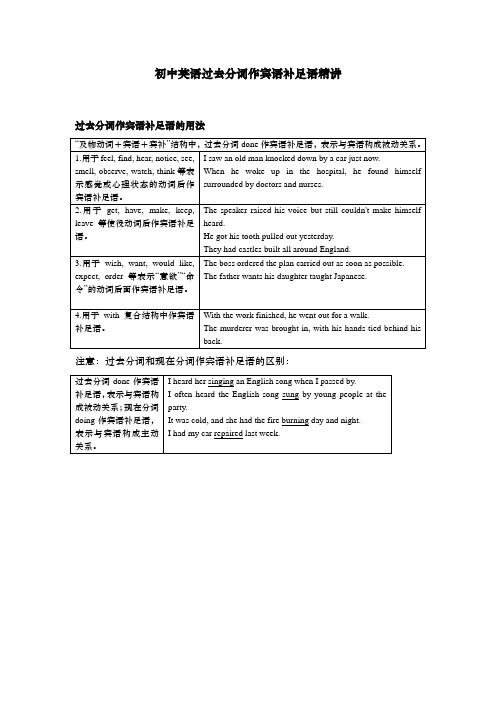
注意:过去分词和现在分词作宾语补足语的区别:
过去分词done作宾语补足语,表示与宾语构成被动关系;现在分词doing作宾语补足语,表示与宾语构成主动关系。
I heard hersingingan English song when I passed by.
The boss ordered the plan carried out as soon as possible.
The father wants his daughter taught Japanese.
4.用于with复合结构中作宾语补足语。
With the work finished, he went out for a walk.
The speaker raised his voice but still couldn't make himself heard.
He got his tooth pulled out yesterday.
They had castles built all around England.
3.用于wish, want, would like, expect, order等表示“意欲”“命令”的动词后面作宾语补足语。
I often heard the English songsungby young people at the party.
It was cold, and she had the fireburningday and night.
I had my carrepairedlast week.
过去分词作宾补
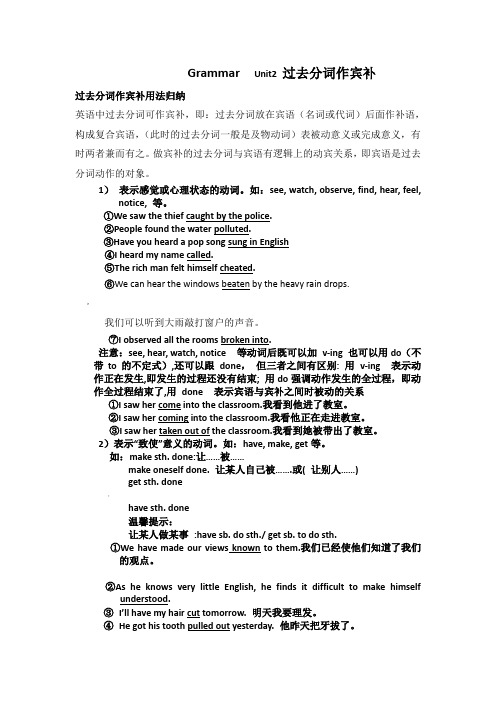
Grammar Unit2 过去分词作宾补过去分词作宾补用法归纳英语中过去分词可作宾补,即:过去分词放在宾语(名词或代词)后面作补语,构成复合宾语,(此时的过去分词一般是及物动词)表被动意义或完成意义,有时两者兼而有之。
做宾补的过去分词与宾语有逻辑上的动宾关系,即宾语是过去分词动作的对象。
1)表示感觉或心理状态的动词。
如:see, watch, observe, find, hear, feel, notice, 等。
①We saw the thief caught by the police.②People found the water polluted.③Have you heard a pop song sung in English④I heard my name called.⑤The rich man felt himself cheated.⑥We can hear the windows beaten by the heavy rain drops.>我们可以听到大雨敲打窗户的声音。
⑦I observed all the rooms broken into.注意:see, hear, watch, notice 等动词后既可以加v-ing 也可以用do(不带to的不定式),还可以跟done,但三者之间有区别: 用v-ing 表示动作正在发生,即发生的过程还没有结束; 用do强调动作发生的全过程,即动作全过程结束了,用done 表示宾语与宾补之间时被动的关系①I saw her come into the classroom.我看到他进了教室。
②I saw her coming into the classroom.我看他正在走进教室。
③I saw her taken out of the classroom.我看到她被带出了教室。
2)表示“致使”意义的动词。
如:have, make, get等。
过去分词作宾补
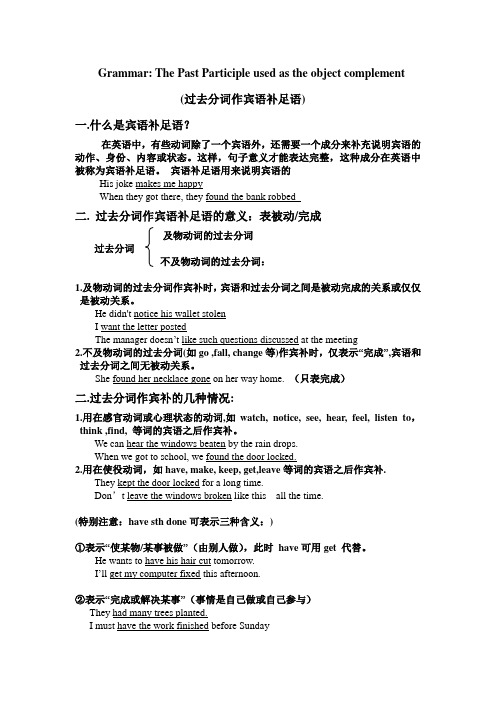
Grammar: The Past Participle used as the object complement(过去分词作宾语补足语)一.什么是宾语补足语?在英语中,有些动词除了一个宾语外,还需要一个成分来补充说明宾语的动作、身份、内容或状态。
这样,句子意义才能表达完整,这种成分在英语中被称为宾语补足语。
宾语补足语用来说明宾语的His joke makes me happyWhen they got there, they found the bank robbed二. 过去分词作宾语补足语的意义:表被动/完成及物动词的过去分词过去分词不及物动词的过去分词:1.及物动词的过去分词作宾补时,宾语和过去分词之间是被动完成的关系或仅仅是被动关系。
He didn't notice his wallet stolenI want the letter postedThe manager doesn’t like such questions discussed at the meeting2.不及物动词的过去分词(如go ,fall, change等)作宾补时,仅表示“完成”,宾语和过去分词之间无被动关系。
She found her necklace gone on her way home.(只表完成)二.过去分词作宾补的几种情况:1.用在感官动词或心理状态的动词,如watch, notice, see, hear, feel, listen to,think ,find, 等词的宾语之后作宾补。
We can hear the windows beaten by the rain drops.When we got to school, we found the door locked.2.用在使役动词,如have, make, keep, get,leave等词的宾语之后作宾补.They kept the door locked for a long time.Don’t leave the windows broken like this all the time.(特别注意:have sth done可表示三种含义:)①表示“使某物/某事被做”(由别人做),此时have可用get 代替。
过去分词作宾语补足语
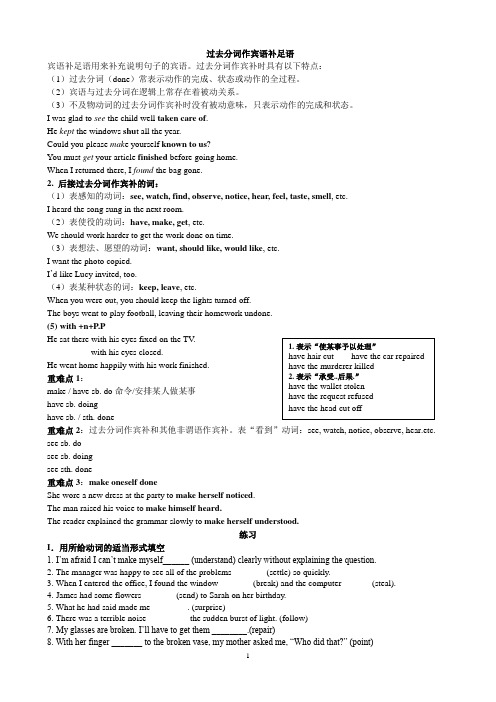
过去分词作宾语补足语宾语补足语用来补充说明句子的宾语。
过去分词作宾补时具有以下特点:(1)过去分词(done )常表示动作的完成、状态或动作的全过程。
(2)宾语与过去分词在逻辑上常存在着被动关系。
(3)不及物动词的过去分词作宾补时没有被动意味,只表示动作的完成和状态。
I was glad to see the child well taken care of .He kept the windows shu t all the year.Could you please mak e yourself known to us ?You must get your article finished before going home.When I returned there, I found the bag gone.2. 后接过去分词作宾补的词:(1)表感知的动词:see, watch, find, observe, notice, hear, feel, taste, smell , etc.I heard the song sung in the next room.(2)表使役的动词:have, make, get , etc.We should work harder to get the work done on time.(3)表想法、愿望的动词:want, should like, would like , etc.I want the photo copied.I ’d like Lucy invited, too.(4)表某种状态的词:keep, leave , etc.When you were out, you should keep the lights turned off.The boys went to play football, leaving their homework undone.(5) with +n+P.PHe sat there with his eyes fixed on the TV . with his eyes closed. He went home happily with his work finished. 重难点1: make / have sb. do 命令/安排某人做某事 have sb. doing have sb. / sth. done重难点2:过去分词作宾补和其他非谓语作宾补。
中学英语语法复习 过去分词作宾补用法归纳

中学英语语法复习过去分词作宾补用法归纳英语中过去分词可作宾补,(此时的过去分词一般是及物动词)表被动意义或完成意义,有时两者兼而有之。
做宾补的过去分词与宾语有逻辑上的动宾关系,即宾语是过去分词动作的对象。
如:She found the door broken in when she came back.(宾补与宾语有被动的关系,表一种状态。
) 一.过去分词用在表状态的动词keep, leave等的后面。
Eg:They kept the door locked for a long time.Keep your mouth shut and your eyes open.(谚语:少说多看)Don't leave such an important thing undone.Don't leave the windows broken like this all the time.二.过分词用在get, have, make, 的后面。
“have +宾语+过去分词”的两种情况:A)表"让某人做某事/让某事(被人)做"eg: I have had my bike repaired.The villagers had many trees planted just then.B)表"遭遇到某种不幸,受到打击/受....影响,蒙受..... 损失"Eg:I had my wallet stolen on a bus last month.The old man had his leg broken in the accident.He had his leg broken in the match yesterday.(MET1986)2."make+宾语+过去分词",在这种结构中,过去分词的动词必须是表示结果含义的。
如:They managed to make themselves understood in very simple English.I raised my voice to make myself heard.三、过去分词用在感观动词watch, notice, see, hear, listen to , feel, find等后面。
- 1、下载文档前请自行甄别文档内容的完整性,平台不提供额外的编辑、内容补充、找答案等附加服务。
- 2、"仅部分预览"的文档,不可在线预览部分如存在完整性等问题,可反馈申请退款(可完整预览的文档不适用该条件!)。
- 3、如文档侵犯您的权益,请联系客服反馈,我们会尽快为您处理(人工客服工作时间:9:00-18:30)。
过去分词作宾补1. Now when people refer to England you find Wales included as well.2. Finally the English government tried in the early twentieth century to form the United Kingdom by getting Ireland connected in the same peaceful government.3. You find most of the population settled in the south.4. They found the window broken.5. ..., so Pingyu had a photo taken standing on either side of the line.1. 及物动词的过去分词作宾语补足语与宾语在逻辑上常存在着被动关系,即宾语是过去分词动作的对象,表示被动意义或已完成意义,有时候两者兼而有之。
补语表示宾语的动作、行为、状态、特性、身份等。
如:I heard my name called. 我听见有人叫我的名字。
When I opened the door, I found the ground covered by fallen leaves. 当我打开门时,我发现地面已被落叶所掩盖。
2. 不及物动词用作宾语补足语时,与宾语没有逻辑上的动宾关系,只表示动作的完成或状态。
如:When I returned there, I found the bag gone.当我返回那儿时,我发现包不见了。
They found all the guests gone when they woke up.当他们醒来时,发现所有的客人都走了。
3. 过去分词常在下列情况下用作宾语补足语:(1) 在感观动词consider, feel, find, hear, listen to, notice, see, think, watch等后。
如:The tourists found the chairs occupied.旅行者们发现椅子有人坐了。
He felt himself seized by a strong arm from behind.他感到后面有一只强有力的手把他抓住了。
注:一些感官动词后可跟不带to的动词不定式或现在分词作宾语补足语,现在分词表示动作正在进行,不定式表示一个动作的全过程。
如:When I came in, I found him lying in bed.我进来时发现他躺在床上。
I saw him enter the house and go upstairs.我看见他进了屋子上楼了。
(2) 表示思维活动的动词如consider, know, think等后。
如:I consider the matter settled. 我认为这件事解决了。
I thought myself wronged somehow in the bargain.我认为自己在这场交易中有些受了愚弄了。
(3) 表示“爱憎、意愿;希望、要求、命令”的动词expect, hate, like, order, want, wish 等后。
如:Would you like it wrapped in brown paper, sir, or in white?先生,你喜欢把它用棕色的还是白色的纸包上?I wanted two tickets reserved. 我要预定两张机票。
He didn’t wish it mentioned. 他不愿这事被提起。
(4) 表示“致使”或“保持(某状态)”的动词如get, have, keep, leave, make等后。
如:He got the watch repaired. 他请人把表修好了。
His new duties kept him occupied. 他的新职务使他无暇抽身。
Did you leave the doors and windows firmly fastened? 你把门窗都关紧了吗?You must make yourself respected. 你必须让自己受到别人的尊重。
注:(1) 在“make+宾语+过去分词”中的过去分词必须是表示结果含义的动词。
如:He was trying hard to make himself understood.他尽力使自己被理解。
Could you please make yourself known to us?请你向我们作一下自我介绍,好吗?(2) “have+宾语+过去分词”,宾语可以是人或物,有三种用法:a.表示“让某人做某事”。
b.表示“遭遇到某种不幸;受到打击”。
c.表示“使完成某事”,此事可以是别人完成的,也可以是自己参与完成的。
如:We’ll have the house painted inside and out.我们请人把房子里外都油漆了。
I had my watch stolen in the street yesterday.昨天我的表在街上被偷了。
We must have the work finished before the hurricane comes.我们必须在飓风到来之前完成这项工作。
(“我们”可能参加这项工作,也可能没有参加。
)(3)have后可跟-ing或不带to的不定式作宾语补足语,宾语是“人”,即have sb. doing/do sth.表示“让某人干某事”。
如:Please have some of the students clean the meeting-room.请找几个同学打扫一下会议室。
The story had us laughing all the time. 这故事让我们笑个不停。
(4)在“with+宾语+done(宾补)”这一结构中,过去分词与宾语之间是动宾关系,这一结构通常在句中作时间、方式、条件、原因等状语。
如:With everything well arranged, he left the office.一切都安排妥当以后,他离开了办公室。
He stood for an instant with his hand still raised.他仍然举着手站了一会儿。
With water heated, we can see the steam.水一被加热,我们就会看到水蒸汽。
With the matter settled, we all went home.事情得到解决,我们都回家了。
注:with结构中可接不定式或现在分词,不定式表示一个将要发生的主动动作;现在分词表示一个正在发生或已经结束的主动动作。
如:With a lot of work to do, he was not allowed to go out.由于有许多工作要做,他不被允许出去。
The young teacher felt nervous with the whole class staring at her. 由于全班学生都盯着她看,这个年轻的女教师感到紧张。
4. 过去分词与其它非谓语形式作宾语补足语的区别:非谓语动词作宾语补足语时,句子的宾语就是该非谓语动词的逻辑主语。
现在分词与其逻辑主语之间是主动关系,所表示的动作一般与句中谓语动词所表示的动作同时发生;而过去分词则表示被动关系,该动作一般发生在谓语动词之前或同时发生。
现在分词的被动式作宾补,表示一个正在进行的被动动作。
不定式表示一个主动的将来或已完成动作。
如:Listen! We can hear her singing in the next room.听!我们能听见她在隔壁房间里唱歌。
Did you have your bike repaired? 你找人修好自行车了吗?I saw the child being beaten by his father.我看到那孩子正挨他父亲的打。
We found her greatly changed. 我们发现她变化很大。
My advisor encouraged me to take a summer course to improve my writing skills. 我的指导老师鼓励我参加暑假班提高我的写作技能。
I saw the man enter the room. 我看见那个人进了房间。
注:当宾语为身体某一部位,且作宾补的动词是及物动词时,用过去分词;是某些不及物动词作宾补时,用现在分词的形式。
如:He stood in front of her, with his eyes fixed on her face.过去分词、现在分词和不定式作宾语补足语的区别:1)过去分词作宾补:与宾语之间是被动关系,其动作通常先于谓语动词完成。
2)现在分词作宾补:与宾语之间是主动关系,其动作与谓语动词同时进行。
3)不定式作宾补:表示一个完成的动作或看到、听到或感觉到的具体动作的过程。
I saw him opening the window. 我看见他正在开窗。
(强调正在,且宾语做了开窗的动作)I saw the window opened. 我看见窗户被打开了。
(完成,被动)I saw him open the window. 我看见他打开了窗户。
(看到宾语开窗的全过程)巩固练习Ⅰ. 用动词的正确形式填空:1. Have you got a map to show me? I’m ________ (puzzle).2. Did he have his wallet _______ (steal) last Friday?3. When I got to the supermarket, I found it _______ (close).4. He found his wife _______ (cook) in the kitchen when he woke up at five.5. He watched the bed ______ (carry) out of the room.6. She doesn’t want her daughter _______ (take) out after dark.7. When will you have your eyes _______ (examine)?8. My mother got me ________ (check) all the homework I did last night.9. With the boy ______ ( lead) the way,we will find the house easily tomorrow.10. I can hear the windows _______ (beat) by the heavy rain.11. Tom has been away from home for two years, leaving his room _______ (cover) with dust.12. Why do you leave the baby ________ (cry) there?13. I have to leave my house early ______ (catch) the early bus.14. A cook will be immediately fired if he is found ______ (smoke) in the kitchen.15. The managers discussed the plan that they would like to see ______ (carry) out the next year.Ⅱ. 根据汉语意思,在空格处填入恰当的词。
